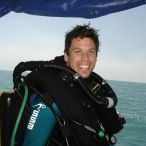DNA reveals the past and future of coral reefs
New DNA techniques are being used to understand how coral reacted to the end of the last ice age in order to better predict how they will cope with current changes to the climate. James Cook Univer

From 2005 to 2022, the main node of the ARC Centre of Excellence for Coral Reef Studies was headquartered at James Cook University in Townsville, Queensland (Australia)








Abstract: A dramatic, undesirable and persistent phase-shift among marine landscapes is observable on temperate rocky reefs as a result of sea urchin overgrazing. In this presentation, I will detail the key findings from over a decade of research on the ongoing threat of urchin overgrazing in eastern Tasmania – a threat driven by the interaction of climate change and ecological overfishing of urchin predators. Importantly, urchin overgrazing on this coastline demonstrates a discontinuous ‘catastrophic’ phase-shift and I will present results from a range of field-surveys, plus small and large-scale experiments (utilizing no-take Marine Reserves plus translocations of large predators) to show that ‘an ounce of prevention is worth a ton of cure’ for managing urchin barrens in Tasmania.
Generality of this phase-shift dynamic will then be explored for urchin grazing systems on rocky reefs across the world by compiling available survey and experimental data. From this collaborative research effort, a globally-coherent pattern emerges with urchin overgrazing broadly defined as a catastrophic phase-shift with hysteresis effect of approx. 1 order of magnitude in urchin biomass between critical overgrazing versus kelp recovery thresholds.
Importantly, as demonstrated in Tasmania and elsewhere, human-derived stressors can act to erode resilience of productive kelp beds while strengthen resilience of impoverished urchin barrens, thus exacerbating the risk, spatial extent and irreversibility of an unwanted phase-shift for temperate reefs.
Biography: Dr. Scott Ling is a postdoctoral Research Associate in Marine Ecology working with Prof. Craig Johnson at the Institute for Marine & Antarctic Studies (IMAS), University of Tasmania where he also completed a BSc Hons (first-class) and PhD in Marine Ecology. His research experience spans a broad range of temperate marine ecological investigations with a strong focus on in situ sub-tidal surveys and experimental manipulations spanning > 1500 research dives over the past 15 years. Much of his research has centred on investigating the effects of increasing, but ostensibly manageable, human stressors on temperate marine ecosystems such as fishing, climate change, increasing urbanisation and the introduction of invasive species. Central to his research interest is the identification of alternative ecosystem states and processes influencing shift to less desirable states, particularly those proving surprisingly difficult to reverse.
New DNA techniques are being used to understand how coral reacted to the end of the last ice age in order to better predict how they will cope with current changes to the climate. James Cook Univer
A new study on the effects of climate change in five tropical countries has found fisheries are in more trouble than agriculture, and poor people are in the most danger. Distinguished Profess
James Cook University researchers have found brightly coloured fish are becoming increasingly rare as coral declines, with the phenomenon likely to get worse in the future. Christopher Hemingson, a
Researchers working with stakeholders in the Great Barrier Reef region have come up with ideas on how groups responsible for looking after the reef can operate more effectively when the next bleaching
Abstract: As marine species adapt to climate change, their heat tolerance will likely be under strong selection. Individual variation in heat tolerance and its heritability underpin the potential fo
Abstract: The Reef Ecology Lab in KAUST’s Red Sea Research Center explores many aspects of movement ecology of marine organisms, ranging from adult migrations to intergenerational larval dispersal
Abstract: Macroalgal meadows are a prominent, yet often maligned component of the tropical seascape. Our work at Ningaloo reef in WA demonstrate that canopy forming macroalgae provide habitat for ad
Abstract: Sharks are generally perceived as strong and fearsome animals. With fossils dating back at least 420 million years, sharks are not only majestic top predators but they also outlived dinosa
Abstract: Connectivity plays a vital role in many ecosystems through its effects on fundamental ecological and evolutionary processes. Its consequences for populations and metapopulations have been
Abstract: Evolution of many eukaryotic organisms is affected by interactions with microbes. Microbial symbioses can ultimately reflect host’s diet, habitat range, and even body shape. However, how
Abstract: The past few years have seen unprecedented coral bleaching and mortality on the Great Barrier Reef (GBR) but the consequences of this on biodiversity are not yet known. This talk will expl